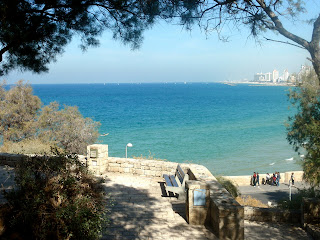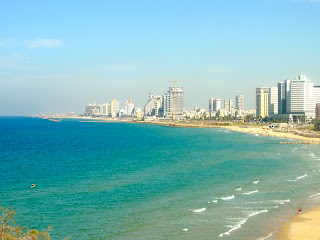On December 9th, I went to the annual Human Rights March in Tel Aviv. I could try to tell you all about what it was like to march alongside thousands of Israelis who were there in support of different human rights groups. I could try to express the hope that I felt after meeting Israelis who were not completely hateful toward Palestinians. I could try to explain the different groups that were marching. But instead of trying to tell you, I'd like to just show you.
(Look at the watermark in the bottom corner for info about where the image came from - all images not watermarked are from demotix.com, unless otherwise noted.)
(Look at the watermark in the bottom corner for info about where the image came from - all images not watermarked are from demotix.com, unless otherwise noted.)
| One of my few photos from the march. From left to right: Eitan Bronstein (director of Zochrot), Ryan, Rachelle, Me, Sarah - all MCC staff. |
|
|
| Me holding a sign with a photo of a Palestinian refugee. Originially, these photos of refugees were printed at human size and installed in the remains of their villages, which are now in Israel. Photo by Ryan. |
 |
|
African immigrants (especially Ethiopian Jews) are often treated unfairly and even allegedly denied citizenship based on their race.
|
 |
|
Trauré, an immigrant from Cote d'Ivoire, holds a sign saying "Refugees are not criminals" in front of the municipality building.
|
 |
The Zochrot signs that we were carrying were too large for just one person, so we paired up and each took a side. My sign-carrying partner (who we'll just call "L") was an Israeli Jew who was born and raised in Tel Aviv. She was so helpful in translating the Hebrew signs, and sharing a little bit of her experience with me. When we walked past these two boys, one blindfolded and tied up and the other with chains around his wrist, we had a very interesting conversation. I literally wrote it down right after it happened so that I could share it with you:
L: "You know, these guys did this same thing at a protest a few months ago and got arrested for it."
Me: "What? Why? They're being completely non-violent. They're not doing anything wrong."
L: "Their message hit too close to home. It was the truth, so the soldiers arrested them."
Me: "But... you can't just arrest someone. You have to have a legitimate reason!"
L: "What do you think this is, a democratic state? You can't just go around saying whatever you want. We're not in America, Meredith, we're in Israel. We don't have freedom of speech like you do. They say we do, but it is a lie."
"It is a lie."
Those words haunted me for quite some time after leaving the protest. I mean, I knew some things were a lie. Well, maybe not a lie, but an omission of the truth. No one ever talks about the Palestinians who lived in the land before 1948. No one talks about the families who were ripped out of their homes and are now refugees. No one talks about the children who saw their parents murdered. No one talks about the injustice, or the permanent damage that has been done to millions. But those aren't lies, they're just... the absence of the truth. But if, as L said, "freedom of speech" here is a lie, well then that's something else entirely.
Something to think about when I've had a little bit more sleep.









































